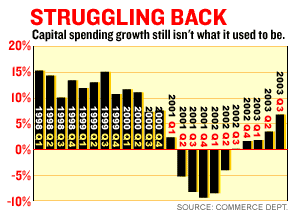NEW YORK (CNN/Money) -
The buzz on Wall Street is that, thanks to generous corporate tax incentives, boatloads of cash are scudding toward technology firms in 2004. But here's a case where tech may not be the biggest winner.
Back in May, in its effort to juice an economy that was still shedding jobs, Congress upped the first-year depreciation allowance businesses can write off on new capital investments to 50 percent from the 30 percent allowance enacted following Sept. 11. But this "bonus depreciation," as it is called, sunsets at the end of the year.
Companies looking to take advantage of the tax break may opt to buy the equipment they might otherwise have bought in 2005 in 2004. And make no mistake, companies are always looking for a tax break.
"Corporation spending decisions are driven far more by taxes than outsiders realize," said Jeff Matthews, president of the hedge fund Ram Partners. "If there's a way to save money by utilizing this tax break, they'll do it."

Putting it all together, many observers expect to see a flurry of business spending, particularly in the latter part of the year as the drop-dead date on the tax break approaches. And since tech accounts for around 60 percent of what Corporate America spends on new equipment, you can guess where the focus is. Comparisons to the flurry of tech spending that came in 1999, as companies fretted over year-2000 glitches, abound.
"This could well touch off a late-year pre-Y2K style of business spending spree as CIOs convince management that it is cost effective to spend part of the '05 budget in late 2004," wrote Merrill Lynch chief North American economist David Rosenberg in a recent note.
Hold your horses
Stirring stuff for investors -- it's always nice to have another excuse to buy Oracle (ORCL: Research, Estimates). But it may be that the real spending splurge occurs away from technology.
It's important to remember that the depreciation bonus merely front loads a write-off that companies were going to get anyway, points out Goldman Sachs economist Bill Dudley. That's still a good thing -- a dollar today is worth more to a company than a dollar in 2007 -- but it would be a better thing in an environment where inflation and interest rates were higher than they are now.
Furthermore, when it comes to technology, deflation is the watchword. You may get less cheeseburger for your buck next year, but you'll probably be able to get a whole lot more computing power.
"Would you really buy a computer early if computing prices are falling?" asked Dudley. "You'll probably have a bit of a bulge in spending in the fourth quarter, but we think people are overstating the benefits."
Meantime, UBS global technology strategist Pip Coburn found that 64 percent of U.S.-based Chief Information Officers he polled "had either 'not reviewed' or were 'not sure' of the potential tax breaks available in 2004." He reckons that through the year they'll get up to speed on the tax break and recognize they've got a sweet opportunity to buy stuff.
The real winners
But maybe the CIOs aren't focused on the tax break because they don't control the purse strings -- that's the Chief Financial Officers' job. And maybe the CFOs decide that the best way to take advantage of bonus depreciation is to buy non-high tech equipment. A conference table, say, or a new air conditioning system for that room the CIO keeps all the servers in. These are things that have held their prices well and, because their depreciation schedules are longer than for tech, getting a 50 percent depreciation allowance up front represents a bigger benefit.
Who will be the biggest winners? A good place to start may be to look for areas of the economy where capital equipment prices have been rising markedly, giving purchasers an extra incentive to take advantage of the tax break and buy equipment in 2004 rather than 2005.
According to the latest wholesale inflation report from the Labor Department, mining machinery prices are up 1.6 percent over the past year, agricultural machinery is up 1.3 percent and oil field and gas field machinery is up 3.7 percent. Surging agricultural commodity, energy and metals prices -- suggestive of heightened demand -- make buying the equipment you would have bought next year early an even easier decision.
The upshot is that while outfits like IBM (IBM: Research, Estimates) will doubtless get some benefit from Washington's generous corporate tax incentives, it's industrial companies like Caterpillar (CAT: Research, Estimates), Deere (DE: Research, Estimates) and 3M (MMM: Research, Estimates) that will get the biggest kick.

|

